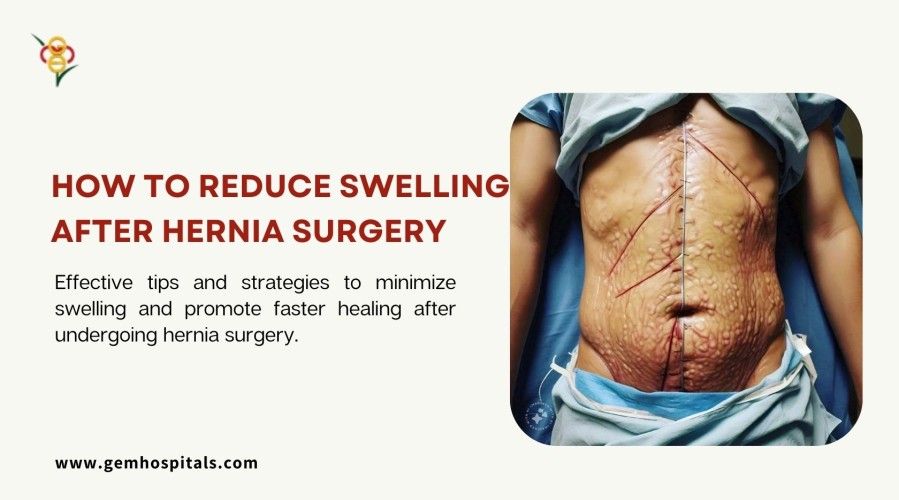Learn what gallstones are, their common symptoms, causes, and treatment options. Discover when to seek medical care and how to manage gallstone complications effectively.
How to reduce swelling after hernia surgery?

The surgical procedure for hernia is a common thing it says done to repair the hernia. Commonly this condition is done when an organ or tissue is protruding through a weak spot around the abdominal wall. With modern tools, this surgery has become more safe and effective but swelling can result as a post-operative side effect. There is no need to worry about it there will be some sort of discomfort which is experienced by the patient it is normal during the healing process. While you are planning to get hernia surgery it is good to have an understanding about how to manage and reduce the swelling after getting hernia surgery that will be handy in returning to their daily activities more quickly. Explore the below blog that will give you enough information regarding reducing post-operative swelling and also enhancing a smoother recovery.
What is post-surgical swelling?
The inflammation or swelling after the hernia surgery is going to be the natural healing process that is the response to tissue trauma. During the surgical procedure, the tissues are going to be cut, moved, or manipulated in that case inflammation going to be their response. This inflammation leads to the accumulation of fluid in the affected area which results in swelling. But when there is excessive swelling it’s going to cause discomfort and also increase the time of recovery. So managing the swelling is one of the essential factors of post-operative care.
Stick to the post-operative instructions
For how getting arena surgery becoming an essential thing for an individual post-operative care is even more important than before because when you are giving attention to your recovery process as soon as possible you can return to your daily activities. To make the healing process easier your surgeon will provide some sort of post-operative instructions based on the individual’s needs strictly hardier to the guidelines that will speed up the healing process. Those instructions may include wound care, medication, and activity restrictions.
Apply cold compresses
Generally, when there is swelling following cold therapy you can able to constrict the blood vessel through this the blood flow and fluid accumulation will be reduced. While you are applying a cold compress try to maintain at least 15 to 20 minutes and follow several times a day specifically during the first 48 hours of surgery. Try to follow the consistency to get effective results in reducing the swelling after hernia surgery.
Keep the affected area elevated
Keeping the affected area at an elevation point is going to be simple at the same time one of the effective techniques to reduce the swelling. By keeping the surgical area elevator you could able to enhance the drainage of excess fluid and as a result, swelling will be reduced.
Stay hydrated
During the post-surgical care of a hernia generally through keeping yourself hydrated all the time the toxins and excess fluids from the body will be flushed out in this case drinking plenty of water after arena surgery will help you in flushing out the toxins and reduce the inflammation. Try to drink at least eight to 10 glasses of water a day and completely avoid dehydration because that means slowing down the healing process.
Gentle exercises
For a healthy life, exercise is going to be one of the essential things in that instance following the gentle exercises and giving gentle movement will help you in reducing this swelling and also prevent other complications like blood clots in the affected area.
Minimizing the swelling after hernia surgery is an important aspect of the healing process. So follow some of the post-operative instructions provided above and take care of yourself to speed up the recovery process. All the above consult with a healthcare provider when any kind of complications is experienced.
If you're experiencing symptoms of a hernia don’t wait. Contact GEM Hospital today to schedule an appointment.
Blogs & Article
Learn about bloating and gas problems, including common causes, symptoms, and effective solutions to improve digestion, reduce discomfort, and maintain gut health.
Learn how unverified Ayurveda treatments may cause liver damage, understand the risks, symptoms, and why medical guidance is essential for safe care.


